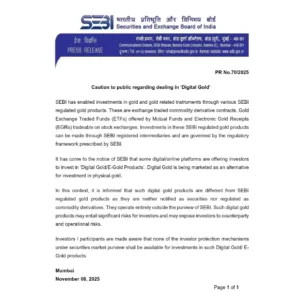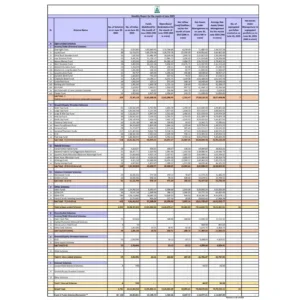The Securities and Exchange Board of India (SEBI) has introduced new guidelines that allow the use of cash-collateral-funded securities as part of the maintenance margin for margin trading. This move comes in response to requests from market participants, particularly through the Industry Standards Forum, aimed at easing margin trading requirements. SEBI’s decision is designed to reduce the burden of additional collateral on investors while promoting a more business-friendly environment.
Under the new rules, securities such as stocks or exchange-traded funds (ETFs) that are used as collateral by brokers must be kept separate from those bought using margin trading. This ensures transparency and accuracy when calculating the total funding amounts.
Key Highlights:
1. Cash Collateral for Margin Maintenance: SEBI now allows brokers to use cash collateral collected from clients as part of the maintenance margin for margin trading. If a broker uses the client’s cash collateral to meet settlement obligations with the Clearing Corporation (CC), the securities received from the CC can be pledged to the broker and used as maintenance margin.
2. Funded Stocks from Group 1 Securities: When clients provide cash collateral for margin trading, the stocks bought with that funding must belong to Group 1 securities. These stocks will be valued based on the value-at-risk (VaR) methodology, with an additional five times the extreme loss margin, regardless of whether they are available in the futures and options (F&O) segment.
3. Reporting Requirements: SEBI has instructed trading members to report their margin trading exposure to the authorities by 6 p.m. on T+1 day (the day after the trade). This will help in maintaining transparency and monitoring compliance with margin trading guidelines.
The new guidelines are expected to make margin trading more accessible while ensuring that proper risk management protocols are in place. By separating funded stocks from other collateral and mandating more stringent reporting, SEBI aims to strike a balance between ease of trading and financial safety.
These changes are part of SEBI’s broader effort to improve market functioning and address the evolving needs of investors and brokers. They are expected to ease operational complexities for brokers and provide more flexibility to clients engaged in margin trading.
Bringing you the latest updates on finance, economies, stocks, bonds, and more. Stay informed with timely insights.
























Be First to Comment